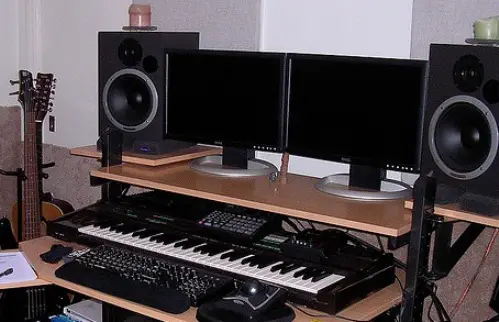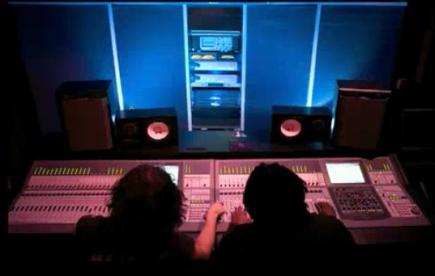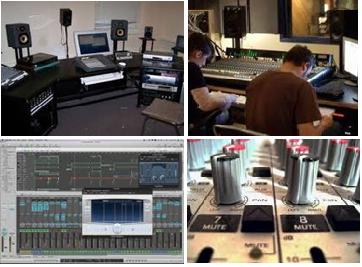
Various Music Production and Audio Recording schools/colleges exist that offer courses/programs that prepare you for a career in the music industry. But are they really worth it? Do you really need to go to a school, college or university to study music production?
The Music industry, though very competitive, has also become more organized and more importantly has become global in nature.
Electronic music production is no longer just about playing music in dance clubs, it can be used for games, video, films, ads, ringtones, etc., and every medium needs to be approached differently.
This is where various schools and colleges have felt the need to impart music production education in an organized way.
Besides teaching you the technical stuff, you are also provided with various opportunities to showcase your talent. They also discuss subjects like music business and legal issues pertaining to the music industry.
With the professional opportunities the entertainment industry has to offer, it is only natural that the universities all over the world have come up with various degree programs that have helped students launch successful careers in the world of recording arts.
Various Types of Degrees Offered
Though a recording art course is designed to include music production as well as audio engineering subjects, it will be helpful for you to know the difference between a music production and audio engineering profile.
Armed with a degree in recording arts, you can look forward to various exciting careers. You can work as a recording engineer, sound engineer, sound designer, recording technician, audio forensic technician, broadcast technician, radio operator, sound effects editor, music producer, etc..
Depending on the length and depth of the program offered, you will have programs such as Certificate, Associate, Bachelor, and Master’s degree in recording arts.
Certificate course is the shortest course, designed usually for introduction to key concepts, software or equipment used in recording business. An associate degree tries to cover course work as in a bachelor degree program but does not go as much in depth. The Certificate course is followed by Associate degree, then Bachelor’s and Master’s being the highest qualification .
Please note that some colleges may offer these programs online as well (web based), as opposed to campus learning programs.
Since the career paths in sound and audio engineering aren’t limited to just one thing, the degree programs in the recording arts prepare students for a wide variety of technological careers dealing with the recording, production and reproduction of sounds, such as music, dialogue and sound effects.
A program that prepares individuals to apply technical knowledge and skills to the production of sound recordings as finished products or as components of film/video, broadcast, live, or mixed media productions, it also includes instruction in sound equipment operation and maintenance; music, dialogue, and sound effects recording; sound track editing; dubbing and mixing; sound engineering; tape, disk, and CD production; digital recording and transmission; amplification and modulation; and working with producers, editors, directors, artists, and production managers.

Music Schools & Colleges are Expensive
Music colleges (especially in American universities) are very expensive, and this question often comes up that whether a music student is better off saving all that money and learning more about music and the music industry on his own, or are there really some benefits of attending a music school/college?
One obvious advantage is that you are going to build relationships, but is it really worth tens of thousands of dollar? Will you be comfortably able to pay back your student loan?
Here we take a look at compelling reasons for attending a premier music college/school, where you will spend a few years pursuing full time music.
English Violinist Nigel Kennedy thinks music students should skip music college
Nigel Kennedy is an English violinist and violist. Although he made his early career in classical music, Nigel has more recently performed in various other genres such as jazz, klezmer and more.
Nigel Kennedy is a big fan of improvisation and enjoys playing what he thinks is right, and what the musicians around him might enjoy doing (rather than playing what the the audience prefers to listen).
Nigel also thinks that music college is a waste of time for students.
He says that no one should perform music just because they ‘can’, or because they think they ought to. ‘People should play something that relates to who they are, and try to give something that’s unique. I wouldn’t prescribe anything to anyone.
That’s why I think all kids should leave music college – they should just get out there and earn a living!
Nigel feels that most professors prescribe the same thing to all the music students, depsite each student having individual strengths & tastes. Nigel says professors are more of talkers (and less of doers), and they are also into teaching because they are likely to get a pension.
“Too many professors have an “automatic recipe”, where they give the same repertoire to all the kids, when one might be better at Dvořák; another might be better at Ligeti. Being a professor is a load of s**te. It’s a way of getting a pension.
Of all the jazz musicians I’ve played with who are worth their salt, none has been a professor. If you play well enough people can learn from you just by listening to you. Either you’re a player or you’re a talker, and it’s better to be a player, in my opinion. If you’re old enough to vote or drive a car, if you’ve got a brain you should be able to get out there and do s**t,” Nigel Kennedy.
Its all about Relationships
This is the most important advantage of attending a full time music college. You will build relationships with lots of people, and it can be a great thing for your music career.
You get to meet high caliber musicians in numbers! You not only make good friends, you will most likely build a successful band or music related business with some of them.
You will suddenly realize that there are lot of better musicians out there, which will encourage you to put in more efforts and become better.
You also get to seek guidance from music teachers and professionals with decades of music industry experience, not just within the university but also outside (at industry events, ensembles, and clubs).
And when you see so many people earning a living from things related to music, it gives you the confidence as well that you will be able to make a career in music, something you’re never sure of when you’re working in isolation (if you don’t join a music college).
Learn the business of music
If you learn music on your own, you are most likely to have limited options as a career – performing, teaching, or may be work as an audio engineer in a small studio. But if you go to music college, you will learn a lot about music business, how the music industry performs, and you will also learn a lot about finance and contracts.
After finishing college, you can work for big labels, studios, music technology companies and so on.
In the past, musicians, bands, producers, managers have lost significant money to bad accounting or manipulative publishing agreements, without suspecting a thing (because they didn’t have adequate knowledge).
A Music school/college allows you to learn the tricks of the trade in a low-risk environment. The contacts you make in college, can serve as those extra pair of eyes to spot any potential problems in contracts/agreements, or to give you valuable inputs as to whether certain decisions are risky or not.
Getting a Scholarship
Studying music production or audio sound engineering degree program from a reputed college, or university is what every student looks forward to, but there are many potential students who are unable to pursue their dreams because it can turn out to be an expensive affair.
The kind of investments that these colleges make in setting up world class recording studio and ensuring that students have access to the best music recording equipment/software make the tuition fees for these courses on the higher side.
Again, considering that a career in audio music production is still considered to be unstable, the high tuition fees can act as a deterrent to many prospective and potential students.
You can get scholarships but even that is easier said than done.
You will definitely have to show some talent if you are looking for a scholarship in any of these music production or audio engineering colleges.
Music Graduates Find it Difficult to Land a Job?
Graduation costs a lot nowadays, and if its in an area such as Music where the perception is that you don’t find employment so easily, its but natural to feel anxious about seeking admission for a music course.
Unlike other courses where you’re more or less sure about what sort of role you would take up one you finish your studies, for music students, it’s less obvious what sort of job you’ll end up with.
So do you really think Music graduates find it difficult to land a Job?
Not really, going by some of the recent statistics. So, if you have a perception that options are narrower and jobs are fewer for music graduates, you probably need to change your views.
Having said that, its also very likely that you may take up some management or administration type of role in the music industry, rather than earn your living as a performer or a composer, which many would love to do.
Fields Where Music Graduates Find Employment
Music graduates are employed across a varied range of fields, such as publishing, editing, media production, broadcasting, and marketing, usually in the creative industry.
There are many who work with professional ensembles but mostly in management roles, as opposed to taking up performing roles.
Music graduates are also employed (lesser percentage) in the finance and banking, legal and consultancy sectors.
Skills Taught in Music Schools / colleges
Experts give the credit of these developments to the highly desirable skills that are developed by music students during their studies.
Skills such as self-management, team work, business and customer awareness, problem solving, communication, numeracy, and IT skills, is what increases one’s employability, and it seems music students develop all of these during their graduation.
Though some of these skills can be self-acquired, music students learn a lot through organizing, hosting, and performing in events, such as customer awareness, public speaking, interaction with the public, which are not usually available to students of other degree programmes.
In addition to covering the traditional elements of a music degree, such as composition, performance, theory, history and so on, newer modules specifically focus on employability aspects.
From Bedroom Producer to Becoming a Professional
Even the less traditional, more focused and hands-on degrees, are quite helpful in grooming the students. These courses emphasize on production values and teach students to a professional standard. Though there’s no guarantee you’ll be the next guy producing Adele.
Students are taught not to depend on having access to a studio, or support or funding from a record label. Artists are taught to publicize themselves. With the internet, artists can easily publish, distribute, and promote their own work.
A successful example is that of O’Shea, who after leaving SAE, set up a self-built studio. From it, he co-founded Bear on a Bicycle, an award-winning Oxford-based music and art collective that cracked the city’s scene in under a year.
These methods are nothing new, but if combined with professional knowledge and experience, it can be a winning, name-making recipe.
Music students really don’t have to leave their future to chance anymore, with most music degrees grooming the students to be more employable. Music grads nowadays are not just confined to their field of study, in fact they go on to do a wide range of jobs in a variety of different industries. With unique skills and a broad range of graduate jobs on offer, music students have much better prospects than most people imagine.
Learning on your own
Joining a school can be expensive, but you can also learn on your own.
You can indeed setup a music studio at home and learn from recording books, tutorials and practicing at home.
One you have a music recording setup at home, which is much cheaper to setup nowadays, or taking up some junior role in a studio and then learning the trade, most beginners through trial and error learn a lot about studio configuration, how to place speakers, microphone and mixing on their own.
Most of the guys who have learnt the ropes on their own in music production would suggest that things can be learnt on your own and networking plays an important role if you want a regular flow of work.
Related: Read more on music recording concepts
Music and video technology is becoming more affordable nowadays, and lot of people are able to setup a decent recording studio right at home. So if you are good, you will continue to make money.
However, this can take time and you may also not be able to network effectively.
A Music technology degree on the other hand will help you to make a good network, so that you can take up bigger projects or work in a bigger studio. You can even take up teaching jobs in a reputed audio music production / sound engineering school or college.
I guess if you have time on your hand and can afford it, definitely go for it.
If you have money to spare, a degree will definitely help you to learn many things faster, which through experience may take more time. A degree in music production or audio engineering might also help you to get that initial break, experience, internship based on the reputation of the college or university from where you do your degree.
What is taught in these courses
Here are some of the important concepts and aspects of sound engineering that you can learn through an audio/music production course in a school/college:

- Learning to use popular production/recording software such as Pro Tools, Ableton Live, Logic, Sonar, Cubase, Reason
- Studio configurations, speaker and microphone placement
- Mixing and mastering techniques that can be applied to variety of music styles
- Mix strategies, compression and panning techniques, and a wide array of professional mix approaches
- Learn to use multi-track recording using MIDI, audio, loops and plug-in effects
- Production techniques from set-up to mix down
How will it help you?
Here is how learning at these audio music production schools/colleges will help you:
- Learn the foundational skills needed to understand popular production hardware/software
- Learn recording, editing, and mixing with these popular music production software
- Take your music production skills, which you may have learnt on your own, to the next level
- Learn to create, produce, and record professional-sounding music arrangements at home
- Under expert guidance and with practice, you can use your learning’s to create compelling, professional-sounding songs
- Learn to identify the production elements that contribute to a well balanced, artful and professional-sounding mix
Closing Thoughts
Though it is possible to learn some aspects of audio and music production right from the comfort of your home, you really need to get trained in audio music production if you wish to take up a career with one of the biggest music studios. There are so many different genres of music and there are so many other channels – videos, movies, television, short films, advertisements, documentaries for which music is required and needs to be recorded in such a way that it complements the captured video.
Learning on your own can be a lengthy process and it may take years for you to get a grasp of technology and to gain the required competency. A better alternative can be to join a music production school (or an audio engineering school if you are keen to take up a career as a sound engineer).
Audio Music Production and Engineering is all about recording music and sound, editing, mixing and reproducing back those sounds using various recording equipment/gear. Learning the intricacies on your own can definitely take time and you may also not be able to spot the various opportunities available to you in the music industry.
Though the debate will continue as to whether these courses/degree programs are worth the investments, it definitely makes sense to explore the various courses that are on offer at music production schools/colleges.
KeytarHQ editorial team includes musicians who write and review products for pianists, keyboardists, guitarists & other musicians. KeytarHQ is the best online resource for information on keyboards, pianos, synths, keytars, guitars and music gear for musicians of all abilities, ages and interests.



Leave a Reply